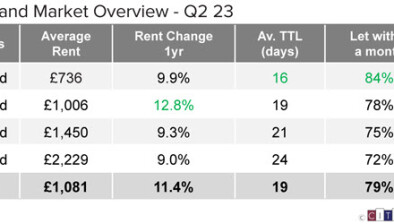Tenant refused permission to appeal eviction decision to Court of Session
A tenant who was refused an extension of the time limit for requesting permission to appeal an eviction decision by the Upper Tribunal for Scotland has been refused permission to appeal to the Court of Session by the same court.

Azhir Sharif was evicted from a property in Glasgow in 2019 on the grounds that the landlord, Dr Mohammed Moughal, wanted to sell the property. He applied to the Upper Tribunal for permission to appeal, but this was refused as his appeal was not made in time.
The appeal was heard by Sheriff Ian Miller.
“Errors of law”
The applicant had a private residential tenancy beginning in September 2018. Notice to leave was given in April 2019. The original First-tier Tribunal eviction case was raised in 2019 by Dr Moughal on the grounds that he wished to sell the let property. The applicant did not appear in the case management discussion but made written representations. In support of this application, the landlord submitted an affidavit affirming his intention as well as an undated letter from a solicitors firm and the appropriate required notices under the Private Housing (Tenancies) (Scotland) Act 2016.
The First-tier Tribunal also heard that the landlord had a large HMRC tax liability, which the applicant questioned in written representations. However, the FtT was satisfied with the evidence presented and granted the application. The tenant applied for permission to appeal the decision to the Upper Tribunal, but it was refused for being submitted out of time.
The applicant then applied for an extension of the time limit for requesting permission to appeal, which the landlord opposed. In his explanation for why the original appeal was not made in time, he stated that it was made in time. This was based on a letter sent to him from FtT administration dated 16 December 2019, with his position being that he had 28 days from the date of that letter, which he described as “the final decision”, to appeal.
The applicant also stated that it would be in the interests of justice to grant the appeal. He believed that the respondent was in fact a wealthy man, that his debts to HMRC were grossly exaggerated, and that he did not need to sell the property to meet them.
The Upper Tribunal refused to grant the extension, stating that the December letter was only an amendment of the original decision letter dated 25 October 2019 that made no change to the reasoning for the decision. It also stated that the alleged wealth of the respondent was irrelevant to the decision.
The applicant sought permission from the Upper Tribunal to appeal to the Court of Session regarding their refusal to grant an extension. This was based on “errors of law” made by the UT, namely “(i) that “the Tribunal, both Lower and Upper, have refused to exercise [their] discretional power, to the prejudice of the Appellant”; and (ii) that “the decisions reached in the present proceedings, at every level, have denied him an opportunity to be heard”, in particular about the personal circumstances of the landlord.
He also argued that he should not be removed from the property without being given an opportunity to make oral representations about other previously intimated matters, namely that he had lived in the property with his wife and children since 1999 and had an informal verbal agreement with the landlord to purchase the property. Additionally, he argued “that the “upper court” [should] be allowed to consider the circumstances in which the Tribunal at any level exercise its inherent discretionary power in applying the rules contained in the Tribunals (Scotland) Act 2014 and to determine whether the Tribunals, at every level, have discharged their obligations to act fairly”.
“Nothing to do with the decision”
In his written decision, Sheriff Miller noted that the two questions he had to answer in this appeal were whether the applicant had raised a point of law, and if he had whether it satisfied the test of being an appropriate ground of appeal.
In respect of the first question, he held that the applicant had not raised a point of law in his application. He said: “The ‘errors of law’ and the ‘important points of principle and practice’ on which the applicant founds in his application raise matters that are nothing to do with the decision appealed against and, with one exception, were never under consideration in making that decision. That exception was the first matter raised in paragraph 2 and that was dealt with by the Upper Tribunal at paragraph [9] of the decision. The Upper Tribunal, in the context of that decision, observed that the matter repeated what he had said previously and concluded that it did not have ‘anything to say about why his appeal was not made in time’. His current application makes no criticism of that exercise of discretion or of the conclusion reached.”
He continued: “The matters in paragraph 3 do not progress beyond general statements about where he considers lie ‘the interests of justice’. Neither paragraph 2 nor 3 poses or raises any recognisable point of law arising out of the issue with which the decision appealed against had to deal or any specific respect in which the decision fell into an error of law. In the absence of a point of law that arises out of that decision, the applicant has not complied with the mandatory requirement of subsection (2)(b) and therefore I must answer this question in the negative. For that reason his application must be refused in this ground.”
Due to his answer to the first question, Sheriff Miller did not need to answer the second question. The application in its entirety was therefore refused.








